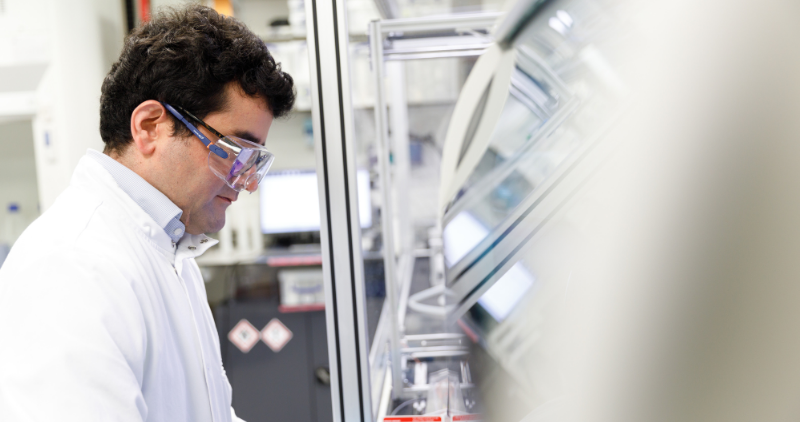AI-designed fibres? Imperial spinout Solena Materials raises $6.7M for next-generation textiles powered by synthetic biology

The global textile industry faces a critical juncture: synthetic fibres account for over 60 million tonnes of annual production, contributing significantly to microplastic pollution, oil dependency, and greenhouse gas emissions. Solena Materials, a London-based biotech spinout from Imperial College, tackles these urgent environmental challenges caused by the industry’s reliance on oil-derived synthetic fibres.
Today, the startup has raised $6.7 million in seed funding to scale its AI-driven platform for designing biodegradable, protein-based fibres. The investment is led by billionaire physicist-turned-investor Sir David Harding, alongsideSynBioVenand existing backer Insempra. This funding reflects the growing demand for sustainable alternatives that combine performance with environmental responsibility.
With the new capital, Solena will relocate within Imperial’s White City Deep Tech Campus to a facility equipped with pilot-scale fibre spinning lines and automated bioreactors. This expansion supports partnerships with undisclosed fashion brands planning to integrate Solena’s fibres into 2026 collections. The company is also recruiting for strain development and lab operations roles as it transitions from R&D to manufacturing.
As a spin-off from Imperial College London, Solena Materials was established in 2022 by Dr.James MacDonald, ProfessorPaul Freemont, and ProfessorMilo Shaffer. Dr. MacDonald serves as CEO and technical lead, bringing expertise in physics and synthetic biology, having developed the foundational technology during his Research Fellowship at Imperial. Professor Freemont leads the Section of Structural and Synthetic Biology, while Professor Shaffer holds the Chair in Materials Chemistry, contributing vital knowledge in bioengineering, materials science, and automation.
Initially based at Imperial’s White City Incubator in London, the company aims to mitigate the environmental impact of synthetic petroleum-based fibres. Through AI-driven design and engineered microbes, it produces high-performance, biodegradable protein-based fibres, offering sustainable alternatives to oil-derived synthetics and resource-heavy natural fibres.
To generate these fibres, the company uses gene-edited microbes—a more sustainable alternative to natural fibres like cotton and petrochemical synthetics like polyester. They use AI methods to tailor the fibres at the molecular level, engineering specific performance features like strength and flexibility for fashion, sports clothing, and technical textiles.
The company’s proprietary deep learning platform enables the design of entirely new protein sequences — proteins that don’t exist — optimised for industrial scalability and specific mechanical properties. This results in fibres outperforming conventional materials in tensile strength, elasticity, and hand feel.
Solena’s co-founder and CEO, Dr. James MacDonald, developed the techniques behind the company as a researcher at Imperial in collaboration with his co-founders. “We’re creating protein sequences that don’t exist in nature to have the performance specifications we need while also being highly manufacturable,” he explained.
Professor Paul Freemont, Solena co-founder and Head of the Section of Structural and Synthetic Biology in Imperial’s Department of Infectious Disease, said: “This extraordinary technology is opening up a whole new paradigm in the design of protein fibres. James has created new protein molecules that can form fibres that currently don’t exist. That’s exciting because no one has been able to do that before — we’ve always had to rely on what nature gave us. Now we’re building our protein fibres from first principles. This will be a paradigm shift.”
The company uses AI techniques to custom-design fibres at the molecular level, producing them with engineered microbes. These AI methods optimise performance characteristics such as appearance, hand-feel, and tensile strength, enabling new possibilities in fashion, sports apparel, and technical textiles.
Since the microbes use renewable feedstocks, the fibres can be produced at a lower environmental cost than petroleum-based synthetics and resource-intensive natural fibres. Unlike traditional synthetic fibres such as polyester, these fibres are also biodegradable.
Professor Milo Shaffer, Solena co-founder and Chair in Materials Chemistry at Imperial, said: “Solena is particularly exciting, not only as a new class of high-performance sustainable fibres for a wide range of applications, but also as an example of a paradigm shift in accelerating materials discovery. The combination of computational design with rapid evaluation in fibre form directly feeds to scaled-up production and implementation, exploiting established textile technology.”
Solena’s model avoids the “green premium” pitfall by targeting performance-first applications. Fibres engineered for moisture-wicking athletics or durable medical textiles can command higher margins, easing market entry before expanding into mass-market apparel. Early adopters stand to gain branding advantages as regulators increasingly penalise synthetic fibre use — the EU’s microplastic restrictions could affect 500,000 tonnes of textile emissions annually by 2030.

Published on Other News Site
















